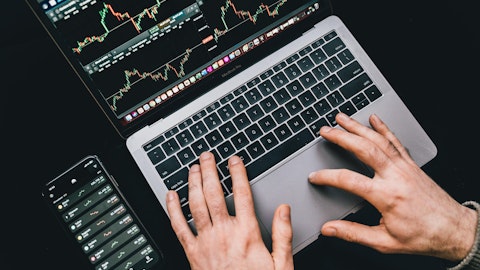2. Colgate-Palmolive Company (NYSE:CL)
Number of Hedge Fund Holders: 54
Cramer recently questioned why Colgate-Palmolive Company (NYSE:CL) stock was down recently, comparing its performance to that of dog food. He explored several potential reasons for the decline, with one of the most significant factors being rising interest rates. According to Cramer, when long-term interest rates increase, as they have since the Federal Reserve began lowering short-term rates, stocks like Colgate’s often face significant pressure.
He pointed out that while dividends are typically seen as a safety net during such times, even they haven’t been enough to protect these stocks from the negative effects of higher interest rates.
“But they become a source of vulnerability when bond yields, the main competition [of] dividend stocks, keep marching higher and they might do that all week because long rates are rising thanks to supply. The Treasury Department sold 3-year note today and the auction fell flat on its face. Tomorrow, the Treasury sells 10-year paper and Wednesday, I don’t know if the market is prepped for a 30-year paper, but there’s a ton coming. As these bonds go down in price and up in yield, things get worse and worse for the dividend stocks, even if there’s actually nothing wrong at the companies.”
Cramer pointed out that another reason for the struggles of consumer packaged goods companies is the strength of the U.S. dollar. These companies, which often have significant operations abroad, are especially impacted by a stronger dollar. Cramer explained how the stock market tends to operate, with consumer staples stocks often moving in tandem.
When the dollar negatively affects a large international company, it can create a ripple effect, bringing down other companies in the same sector, even those that may not be directly impacted. He noted that sector ETFs act like gravity, pulling down all companies within that sector, regardless of their individual performance.
“Now then there’s the most insidious problem of all, the one that no one is talking about. Let’s open the discussion, pricing.”
Cramer discussed the growing issue of pricing pressure, pointing out heavy discounts on consumer products, especially on online platforms. He highlighted the intense competition from large retailers offering low prices, which is creating challenges for businesses.
Cramer suggested that these consumer goods companies are now starting to lose that momentum. He speculated that consumers, who had accepted higher prices during the pandemic, may no longer be willing to tolerate such inflated costs from companies like Procter & Gamble and Colgate. Cramer noted that the market might be indicating that these companies will eventually need to roll back their prices.
“Now, look at this counterintuitive situation. I know it sounds crazy to call Procter & Gamble and Clorox, Colgate risky. These were safety stocks for most of my life, but there’s nothing safe about their stocks anymore.”
Colgate-Palmolive (NYSE:CL) is a leading global manufacturer and seller of consumer goods, known for its wide array of brands such as Colgate, Protex, Sanex, Meridol, Softlan, and Ajax. The company is facing some challenges related to its cost structure in 2024, particularly concerning raw and packaging materials. However, management expects these pressures to arise more from transactional foreign exchange impacts than from the underlying costs of commodities.
At the Morgan Stanley Global Consumer Conference in December 2024, management explained how the company approaches pricing. They adjust prices for the transactional component but avoid making significant adjustments to the translational side, as doing so could harm its competitiveness in local markets. The company takes a comprehensive view of foreign exchange impacts, especially with the recent volatility seen in Latin America.
Colgate-Palmolive (NYSE:CL) management remains confident in the company’s long-term prospects, with expectations for growth in the range of 3% to 5%, which aligns with global economic projections. Additionally, the company has struck a better balance between pricing and volume in 2024, and management expects this balance to continue moving forward.





